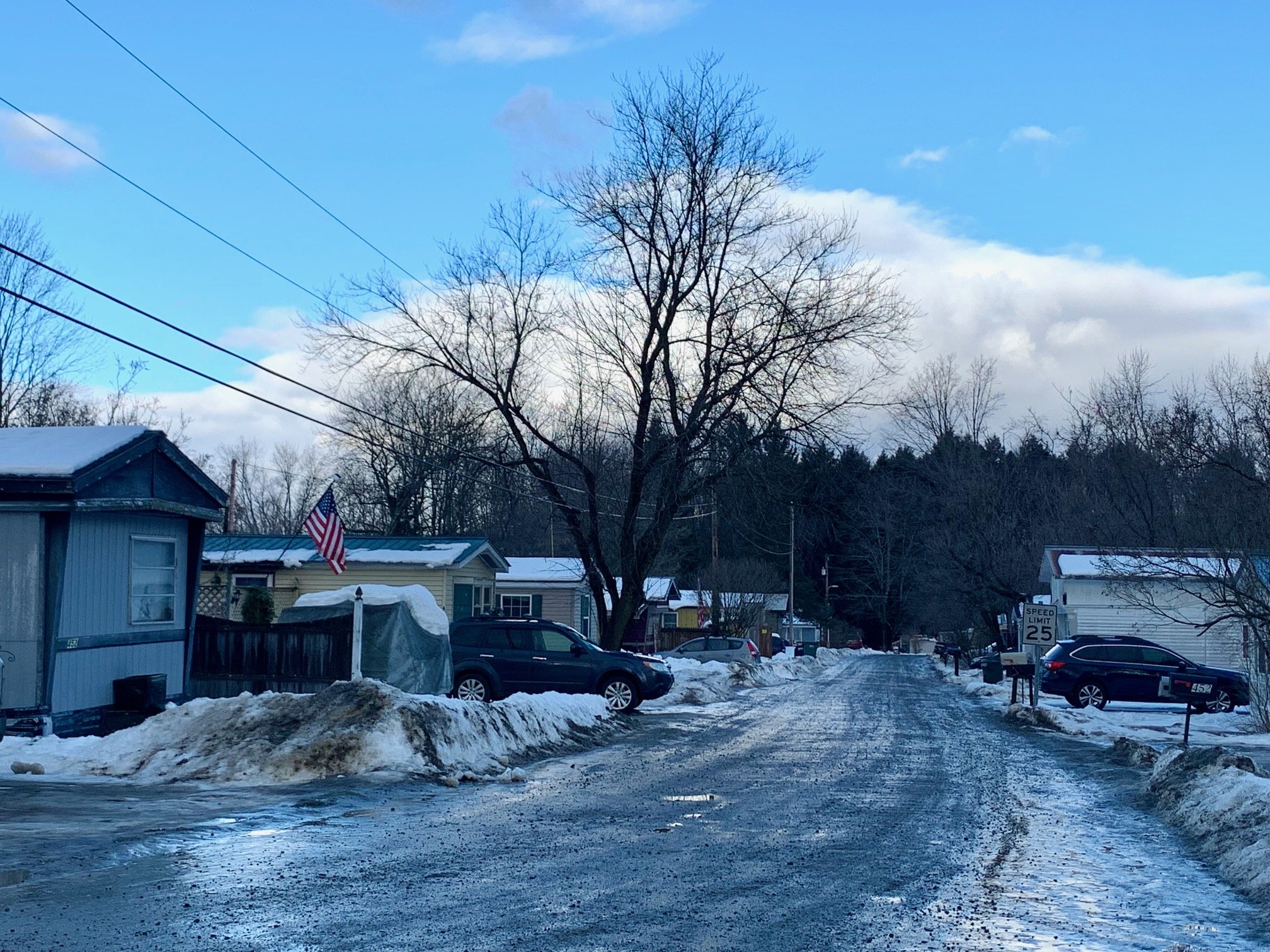Local water infrastructure projects land federal funding
March 23, 2024 | By Lisa Scagliotti In two separate recent announcements, over $3 million in federal funding is headed to Waterbury for water infrastructure projects that will improve water quality for two mobile home parks.
East Wind Mobile Home Park. File photo courtesy MHVillage
U.S. Sen. Peter Welch on March 18 announced a $2.2 million grant to Waterbury to extend a water line from near the town highway garage on Guptil Road westward towards Vermont Rt. 100. The line would run to East Wind Mobile Home Park, connecting the neighborhood and several other residences along the way to the municipal water system.
According to Waterbury Public Works Director Bill Woodruff, the water line extension is about 3,700 feet and it is in the design phase. The neighborhood has 28 homes and its water system has poor quality. The funding would complete the design and engineering and cover some of the construction costs which are not finalized yet, Woodruff said.
Municipal Manager Tom Leitz said that in addition to improving water quality, another benefit to connecting to municipal water is that a presently undeveloped section of the East Wind neighborhood associated with its well location may be able to accommodate several more home sites. That will be determined as the design plans are completed, he said.
The water line extension will also put municipal infrastructure closer to commercial developments along Rt. 100 that may eventually hook up to the system run by the Edward Farrar Utility District, he said.
The East Wind park last year received a $304,000 grant from the state Healthy Homes Initiative program that channeled federal American Rescue Plan Act funding to mobile home infrastructure improvements. That funding was to be used for engineering, permitting and construction related to septic system improvements.
The funding announced recently by Welch’s office was part of nearly $30 million designated for 19 Vermont projects chosen through the Congressionally Directed Spending process in the recently passed federal budget bill. The projects include infrastructure work, economic revitalization, affordable housing and historic preservation.
“Federal funds can help jump-start projects that make a big difference in the community—from improving our water infrastructure systems, to building affordable housing, to making a beloved public library more accessible for everyone,” Welch said in the funding announcement. “I’m thrilled that federal dollars are headed back to Vermont to help strengthen communities across our state.”
Other awards in this round of funding included $5 million for the Champlain Housing Trust and the Bennington County Industrial Corporation for more than 150 housing units, $3 million for the Vermont Agency of Transportation for the Central Vermont Transit Operations Facility, $1.2 million for the Burlington School District to address stormwater on the site of its new high school and more. See the full list here.
Each member of Congress is allowed to request funding for Congressionally Directed Spending projects in federal appropriations bills. Vermont’s congressional delegation is now accepting requests from state and local government and from Vermont nonprofit organizations for inclusion in legislation for fiscal year 2025 which begins October 1.
Kneeland Flats Mobil Home Park also to benefit
In a separate announcement on March 8 by Gov. Phil Scott and the Agency of Natural Resources, Waterbury’s Kneeland Flats Mobile Home Park was among 46 manufactured housing communities receiving a combined $15.5 million in grants to upgrade or replace their water systems. The Waterbury park will receive $1,020,000 million, according to the announcement.
Kneeland Flats Mobile Home Park. File photo by Lisa Scagliotti
The grants are from two state programs: $13.3 million in Healthy Homes Initiative and $2.2 million in Three-acre Stormwater Initiative grants.
The funds are intended to be spent on repairing and upgrading inadequate or failing drinking water, stormwater and wastewater systems.
Overall, the improvements funded through the state programs will benefit an estimated 5,608 residents of the communities spread across Vermont’s 14 counties, officials said. Kneeland Flats Park in Waterbury Center has 55 homes.
“These residents will not only gain more reliable access to safe drinking water, but they will also benefit from improved drainage, stormwater, and wastewater systems, protecting both them and the environment,” said Department of Environmental Conservation Commissioner Jason Batchelder.
Funding for the state grant programs comes from the federal American Rescue Plan Act. This brings a total of $28 million of ARPA funding to 67 manufactured housing communities by the state -- about one-quarter of the state’s mobile home communities, officials said.
The grants may be spent on various stages of projects aimed at improving water infrastructure such as hiring engineering firms to evaluate systems to determine what work is needed, technical and permitting assistance, and actual construction of needed improvements.
For the Kneeland Flats project, the grant is meant to be spent on technical assistance and permitting for a wastewater system, and construction funding for the drinking water system. This latest grant comes in addition to a 2023 grant of $62,000 that the Kneeland Flats development received from the Healthy Homes Initiative. That funding was intended for permitting and engineering costs for water system upgrades.
The full list of 2024 grant recipients is posted here. In addition to Kneeland Flats Mobile Home Park in Waterbury, two other Washington County communities were announced as grant recipients: Sandy Pines Mobile Home Park in East Montpelier with $116,000 for engineering, technical and permitting assistance, and Verdmont Mobile Home Park in Waitsfield with just under $730,000 for construction of a new drinking water system. The Sandy Pines has 56 homes; Verdmont has 29 homes.


